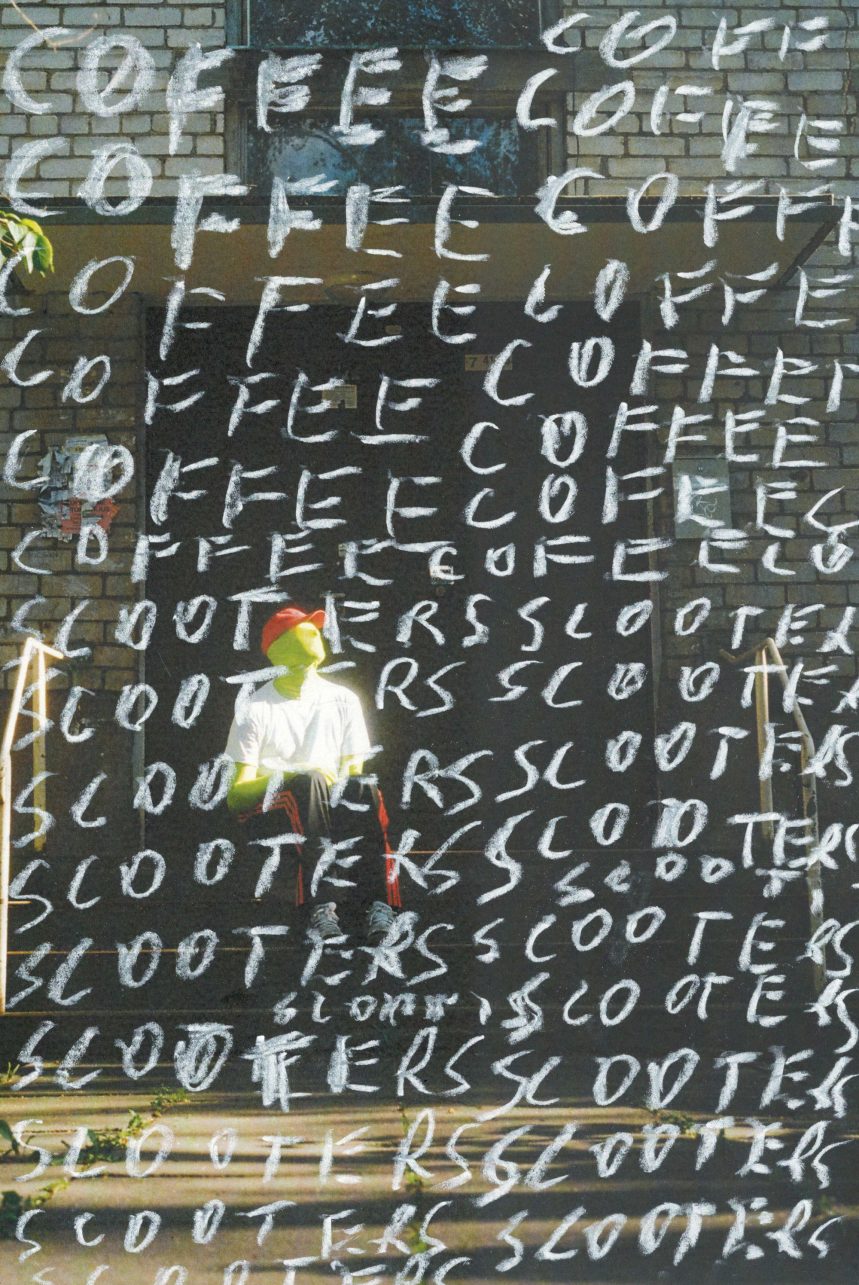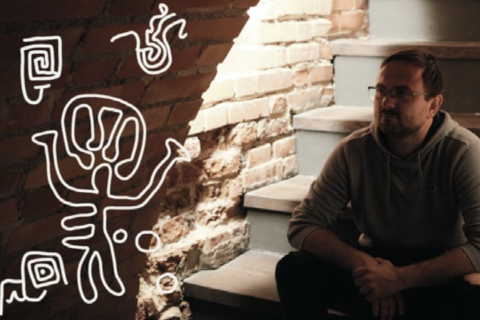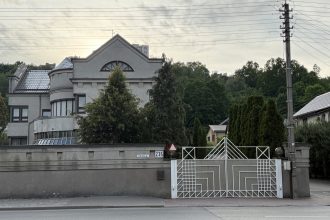Two years ago, the international performing arts festival ConTempo offered an innovation: the experimental program called Off, curated by Kosmos Theatre. For me, the highlight of the program was Tautvydas Galkauskas’ How to Swim, in which the actor teaches a stone to swim. The stone even had its own Instagram account, which I still follow to this day. The personification of an object without animating it was the subject of Tautvydas’ master’s thesis at the Lithuanian Academy of Music and Theatre.
It’s exciting to see that the artist continues his research – this year’s ConTempo program features his new performance starring scooters: objects some people adore, and others loathe. Me more critical ones might refer to them as green invasive objects that disturb the peace of sidewalks and bicycle lanes. The more optimistic would say that scooters finally got them out of their cars. But it turns out the performance Coffee & Scooters isn’t exactly about that.

We talk to Tautvydas, who lives in the capital and comes from the town of Meškuičiai near Šiauliai, remotely, because he has a busy summer. Almost immediately after our conversation, the premiere of Eglė Vertelytė’s play Dance Edita Dance (Šok, Edita, šok, playwright Rimantas Kmita) took place at the State Drama Theatre of Šiauliai, in which Tautvydas plays the object of the heroine’s dreams, a familiar character from the Southern Chronicles (Pietinia kronikas). We also start with objects.
You decided to give a voice to a recognizable object and even created a scooter community. What motivated you to create such a work?
I don’t remember the exact circumstances, but after noticing scooters around the city, I thought it might be interesting to create something about them. Scooters struck me as alive, especially because you can turn them on and off, as if controlling their life. I even considered doing a performance where I’d kidnap a scooter and stage an execution, broadcasting it live on social media, maybe even calling the company Bolt to demand a ransom. It was a rather brutal idea, especially in the context of current geopolitical events, and when I decided to participate in the Open Space performance competition announced by Arts’ Printing House, I scrapped it. I thought to myself: why should I torture them when they’re already mistreated by humans? Instead, I decided to take the opposite approach – to try to defend them, to show that scooters are the way they are because of human actions. After all, scooters are often hated because they’re left lying around anywhere or recklessly ridden.
When I started renting scooters myself, I noticed that they were everywhere, in all sorts of positions, and sometimes badly damaged. Each one seemed to have a story to tell. It reminded me of the idea behind the popular photo project Humans of New York. I even considered interviewing each scooter and sharing their community stories on Instagram.
The description of the performance, in the very first sentence, emphasizes that scooters are the appendicitis of the city; they promote haste and suggest we shouldn’t walk. Do you think that rushing is a vice?
Those words are not mine. I did a survey about scooters, and one person called them urban appendicitis, and another said that they promote haste. I found both expressions interesting and funny.
Overall, I think rushing often has negative consequences. When you’re in a hurry, you get anxious, try to catch up, and everything starts getting in the way – including the scooter itself and the people around you, who slow you down. Personally, I usually only head into the city when I have to rush somewhere. I rarely go out just for the sake of it, without a reason. Most of the time, I need to get from point A to point B, and of course, I leave the house as late as possible and then race across the entire city. Sometimes it even becomes a bit absurd: I decide to go for a walk, and then I rush to a specific spot just so I can start walking there.
Scooters are fighting for their place in the world in your play. What does this struggle really mean? What message are you encoding for the viewer?
The idea of fighting for a place under the sun also came from observing the online space. The impression I got was that scooters were spoiling the landscape, the urban environment. Then, special parking spots are created for them. They’re expected to stand ethically, not bump into pedestrians, and not be in the way. I created a fictional world where their everyday life is a struggle for survival.
The narrator of the performance is a young man who needs to sober up, but then he loses himself every night again and again. Does this sobering have a deeper subtext? Could it be about striving for more awareness, a broader perspective?
The young man – whom I somewhat identify with myself – wants to find meaning in his life. Often, that meaning arises through fighting for something. But when you lack strong convictions, when you’re lost or still not quite “sober,” it’s hard to know how to act or even why it matters.
Let’s go back to How to Swim, which Kaunas saw a couple of years ago. We all pass by various objects every day, such as scooters or stones, but not everyone comes up with the idea of making a performance out of it.
It’s different with each object. Speaking about the stone, it all started with a Lithuanian folk proverb I read, “A person teaches a stone to swim.” At the time, I was participating in the Kosmos Lab creative workshop organized by Kosmos Theatre together with the theater troupe AKHE. One of the tasks was to create something based on a proverb. That’s where I began, I tried, quite literally, to teach a stone how to swim.
I’ve also planned more performances involving other objects. For example, I’m currently developing an idea with a toilet. You go to the bathroom every day, but one day you might think, “Oh, the toilet.” Even though it handles very dirty work, it’s incredibly important and necessary, yet often invisible. I also have an idea involving a rake. What interests me there is a very specific thing: if you step on it, it smacks you in the head. It’s that classic cartoon image.
What do these creative experiments give you as an actor?
I remember that the first time I presented a ten-minute sketch of How to Swim during a creative workshop, I felt a huge sense of relief. I realized that I wasn’t the most important thing: the object was. And I could talk about something other than myself. It’s important for me to distance myself; I don’t like that complete exposure when you come out and start talking about yourself, your life. I’d rather take an object, and I guess those objects stand out to me because in some way, they’re connected to me. I identify with them, with how I see the world at that time. I find similarities, and then we both perform, we both speak on a certain topic, but I do it through the object. It carries its own weight, its own imagined meaning. That takes the responsibility off of me. I don’t even know if that’s an acting or directing perspective; how to find that balance so that neither of us is above the other, but we’re constantly fighting for attention and sharing it.
In How to Swim, I try to teach a stone to swim, I do all sorts of activities with it, but it doesn’t really matter whether I succeed in teaching it or whether I achieve my goal. At first glance, these are motivated, purposeful actions, but in the end, you realize the effort is meaningless. Instead of repeatedly trying to teach the stone something, I realize that I need to become a stone myself. To be a stone is to be real and at the same time to be nothing, to be secure in who I am, to be patient. Then I can be eternal and there will no longer be any need to rush anywhere.
The feeling I try to express is best captured by the poem “I Wish I Were a Stone” by Mahmoud Darwish, which can be heard at the end of How to Swim. For me, as Tautvydas, it’s very important to believe that I can become a stone and maybe that’s how I’ll live my life: trying to become one. Every object that appears in my performance or any other future creative form contributes to this goal. And as long as I am not yet a stone, I think it’s very important to draw attention to the rights of rental electric scooters.
In your previous answer, you returned to the theme of struggle. Indeed, many ConTempo festival performances that take place in public spaces must compete for the attention of passersby with cars, hot air balloons, ice cream, and other distractions. How do you feel in those situations?
I like it when the performance space already has its own energy, when it works on its own. In that case there seems to be no need for scenography; a different kind of relationship with the particular space and the audience naturally forms. It’s challenging for me because I have to adapt every time.
It feels more authentic when a performance takes place in the city, in a space not intended for theater. How to Swim was mostly performed in theaters, but now I’m presenting it in other places too. In June, I performed it in a garage in Šiauliai. And the premiere of Coffee & Scooters happened last summer at the space Utopia in Vilnius. In Kaunas, we’ll perform it near Science Island and in the courtyard of the Lithuanian Police School in Mastaičiai. That’s quite ironic, since my actions with the scooters aren’t necessarily 100% legal.
Tautvydas, we’re speaking just before the dress rehearsal of a new theatre performance, in which you’re acting. I’m glad you fit this conversation into your schedule. So – what do you do when you’re not in a hurry?
I like to sleep, read, and watch films. I do everything very slowly: I take a long time to eat, a long time to drink my coffee, then I go read, watch a movie, take a walk. That’s a perfect unhurried day. Maybe it looks boring from the outside, but that’s how I relax.
So, does that mean boredom is necessary in life?
When you’re bored, you start thinking about what you could do to make things less boring. That’s when ideas come. On the other hand, creative thoughts often arrive in moments of intense activity too. Sometimes you get much more done when time is short. When you don’t have time, you start valuing it more, thinking more about what you’d do if you had it. Or you try to fit everything in, because time feels so precious, and you want to use it for every activity you care about.
The 7th International Performing Arts Festival ConTempo will take place in Kaunas and Kaunas district on August 2–9. Follow the news: contempofestival.lt




